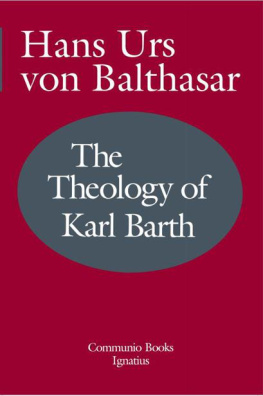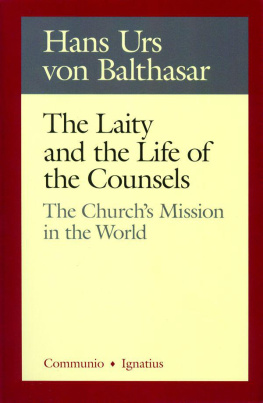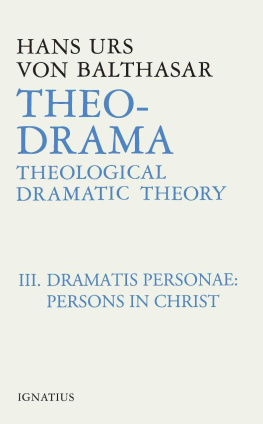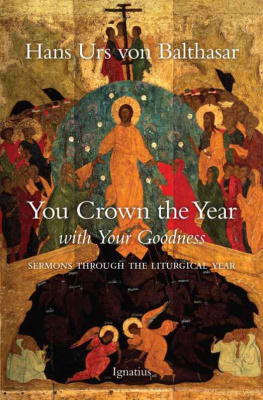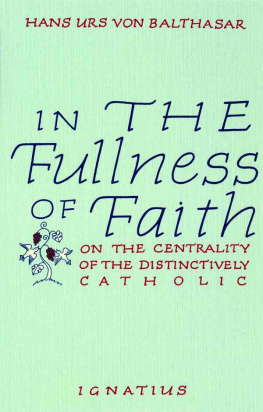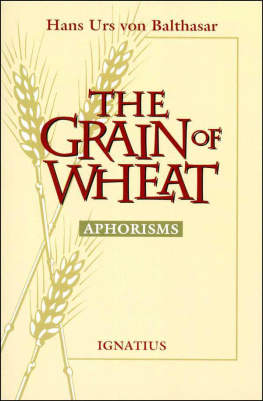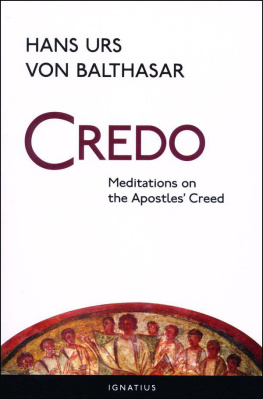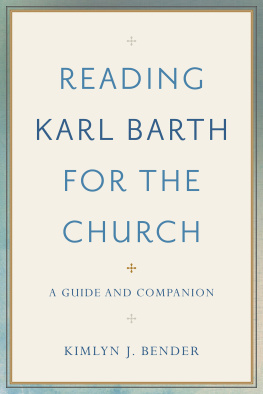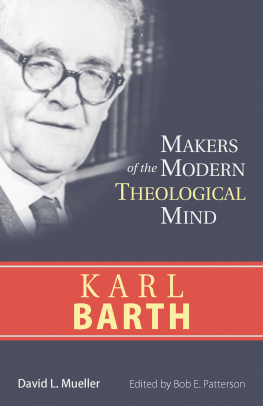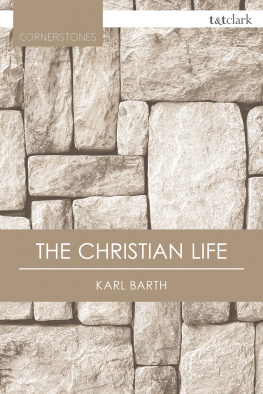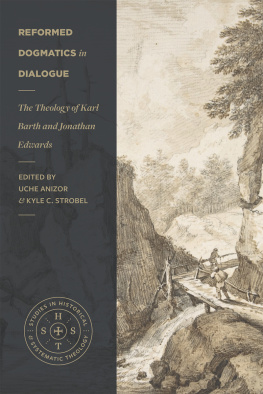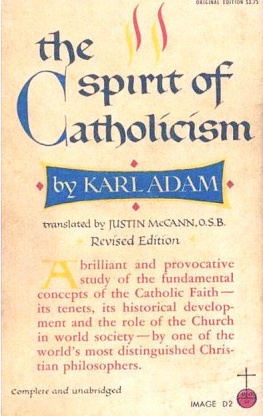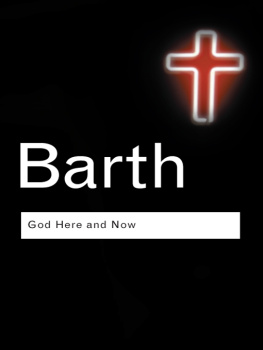THE THEOLOGY OF KARL BARTH
HANS URS VON BALTHASAR
The Theology of
Karl Barth
Exposition and Interpretation
Translated by
Edward T. Oakes, S.J.
COMMUNIO BOOKS
IGNATIUS PRESS SAN FRANCISCO
Original German title:
Karl Barth: Darstellung und Deutung
Seiner Theologie
1951 Verlag Jakob Hegner in Koln
Published with ecclesiastical approval.
Many of the quotations from Church Dogmatics
by Karl Barth are taken from
the English translation published by
T. & T. Clark, Edinburgh
and are used with permission
Cover by Roxanne Mei Lum
1992 Ignatius Press, San Francisco
All rights reserved
ISBN 978-0-89870-398-6
Library of Congress catalog number 92-71929
Printed in the United States of America
CONTENTS
PART I
OVERTURE
PART II
THE FORM AND STRUCTURE OF
KARL BARTHS THOUGHT
Exposition
1. The Epistle to the Romans : First Edition
2. The Epistle to the Romans : Second Edition
3. The Task of Dialectics
1. Early Anticipations: Prolegomena to Christian Dogmatics
2. The Breakthrough
3. The Analogy of Faith
1. The Christological Foundation
2. Creation and Covenant
3. Gods Partner
4. Faith and Reason
5. Sin
6. Analogia Entis
Interpretation
1. Systematization versus the Existential Moment
2. Word and Faith
3. Dialectics and Divine Judgment
4. The Concrete and History
PART III
THE FORM AND THE STRUCTURE
OF CATHOLIC THOUGHT
1. Its Transitional Role in History
2. The Ambiguity of the Concept of Nature
3. The Theological Concept of Nature: Formal and Material Aspects
4. Nature in the Decrees of Vatican I
1. Christ and the Ground of Creation
2. Nature and History
3. Nature and Grace
4. Judgment and Redemption
PART IV
PROSPECTS FOR RAPPROCHEMENT
TRANSLATORS PREFACE
Whatever else historians of the future may say about this era of the Church, they will certainly never call this a period of doctrinal cohesion. But however the verdict falls, this book by the Swiss Roman Catholic theologian Hans Urs von Balthasar on the theology of his great Protestant contemporary Karl Barth will certainly rank as one of the classics of twentieth-century theology. And what will make it so especially striking are the evident power and creativity that come when one theologian, in full adherence to his own tradition and without any attempt to cut corners, meets another theologian who is equally faithful to his own tradition.
This power to bring new treasures from old storehouses was immediately obvious to all who first read this book, a landmark in Barth scholarship. More than any other work by a Catholic theologian at that time, it made clear how much the issues dividing Catholicism from Protestantism had been transformed in the course of four centuries. But von Balthasars work did more than open up new pathways to ecumenical understanding; it showed how a fundamental rethinking of issues could lead, not just to a rapprochement between the two great rivers of Western Christianity, but to an astonishingly new understanding of the Christian message in the modern worldall the more astonishing because this rethinking was conducted (on both sides) in complete fidelity to the great tradition of Christian dogmatics.
An abridged English translation of this book was done by John Drury and appeared in 1971. This translation was itself a momentous event and helped catalyze ecumenical discussion in the English-speaking world. Although it omitted some of the often technical discussions on nature and grace then dominating the European scene, it presented the main theses of the book succinctly and effectively.
However, now that von Balthasars theology as a whole is generating interest in its own right, it was felt that an unabridged translation should appear, giving the full details of the discussion not only for the benefit of historians of dogmatic theology, who will find these details of interest, but also as part of the effort to bring before the English-speaking world the complete works of Hans Urs von Balthasar.
Because the earlier translation not only omitted many of the technical discussions but also often gave the gist of a passage rather than a full translation, I have decided not to supplement the original translation with the omitted passages but to translate the whole book from the original German. The reader will soon notice that von Balthasar is not shy about quoting vast tracts of Barth verbatim (and other authors as well), a practice not usual in American scholarship. I have translated these passages directly, exactly as they occur in the book (there are also long passages quoted in the footnotes; these too are given in full). In this way, the reader will have the book exactly as a German reader had it in 1951.
I should mention that I have avoided the practice of translating Sein as Being with a capital B. This conspicuous capital letter is meant to tell the reader that the verbal infinitive (to be) is intended rather than the verbal noun (beings). The former refers to the act of existence, while the latter refers to the thing that exists. But, to my eyes at least, upper-case Being looks like a thing, while lower-case being conveys better the act of existing (thus, analogy of being rather than analogy of Being). But some passages, on a second reading, seemed ambiguous; so whenever Being is (infrequently) capitalized, it refers to the German infinitive.
Finally, I would like to thank Elisabeth Kohldorfer for assistance with the technical matters of German musicological terminology and for her consistent willingness to help solve other knotty problems of German academic style.
It was a transforming event for me to become so intimately acquainted with this work, and I hope a careful reading of its thesis will have the same effect on the reader.
Edward T. Oakes, S.J.
Feast of the Assumption
August 15, 1991
ABBREVIATIONS
This tabic lists works of Karl Barth that are cited in the body of the text or in the footnotes. Further details on Barths publications are available in the bibliography assembled by Charlotte von Kirschbaum and published in the Barth Festschrift Antwort (Zurich: Evangelisher Verlag, 1956) and in the table at the end of Eberhard Buschs Karl Barth: His Life from Letters and Autobiographical Texts , trans. John Bowden (Philadelphia: Fortress, 1975).
Die Kirchliche Dogmatik (KD)
(Citations to the Church Dogmatics are usually given without accompanying abbreviation but simply with a number indicating the volume and a number indicating the page.) English paginations may be found in the table in the Appendix.
1. I/1 Die Lehre vom Wort Gottes . Teil 1. (1932)
(on the Word of God as criterion of theology)
2. I/2 Die Lehre vom Wort Gottes . Teil 2. (1939)
(on revelation)
3. II/1 Die Lehre von Gott . Teil 1. (1940)
(on the knowledge of God; the reality of God)
4. II/2 Die Lehre von Gott . Teil 2. (1942)
(on predestination and the commandments of God)
5. III/1 Die Lehre von der Schopfung . Teil 1. (1945)
(on the work of creation)
6. III/2 Die Lehre von der Schopfung . Teil 2. (1948)
(on the creature)
7. III/3 Die Lehre von der Schopfung . Teil 3. (1950)
(on the relationship of Creator and creature)
All of the Church Dogmatics is available in English, translated by G. W. Bromiley and T. F. Torrance (Edinburgh: T. & T. Clark, 1936-1977).
Other Major Works
I D Die Lehre vom Worte Gottes: Prolegomena zur christlichen Dogmatik (Munich, 1928).
I R Der Rbmerbrief (first edition; Bern, 1919)
R Der Romerbrief (second edition; Munich, 1922). English trans.: The Epistle to the Romans (Oxford: Oxford University Press, 1935). The English translation is drawn from the sixth edition.
Next page
